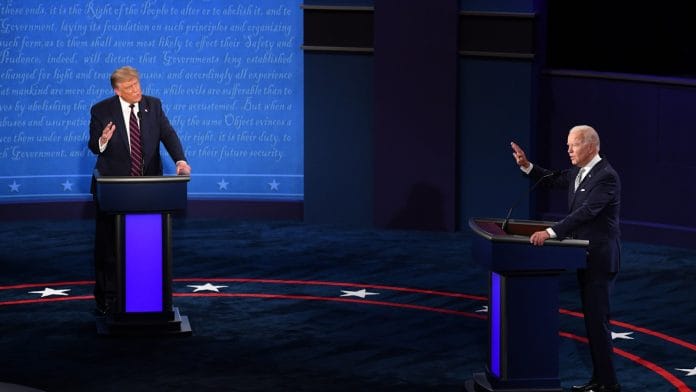New Delhi: With less than a week left for the 3 November election in the US, there are at least five key issues weighing on the minds of Americans — the Covid-19 pandemic, economy and job losses, healthcare, the US Supreme Court and racial tensions. These issues were also discussed in the first and final US presidential debates.
About 74 per cent of registered voters say the economy is an important issue for their vote, 65 per cent say healthcare, 63 per cent say Supreme Court appointments and 55 per cent say Covid-19, according to a survey by Pew Research Center survey conducted from 6-12 October.
The survey also found that these issues are prioritised differently, with backers of President Donald Trump more likely than supporters of his Democratic rival, Joe Biden, to rate the economy as important and vice-versa with healthcare.
Also read: Countering China is now a priority for both India and US. But only one needs the other
Covid-19
The US is currently the worst-hit country in the world with over 2,25,084 deaths as of Tuesday. It has also recorded a total of 86,80,611 cases with around 70,000 new infections a day, making the pandemic a hot-button issue. According to Dr Ashwin Vasan, a doctor and assistant professor at the Columbia University Medical Center, “This election in many ways has become a referendum on that over the last eight, nine months.”
US President Donald Trump himself contracted the virus earlier this month. He has been criticised for downplaying the efficacy of masks and hosting large, crowded political rallies, which former president Barack Obama termed as “super spreader events”. Despite the widespread disruption caused by the pandemic in the US, only 24 per cent of Trump supporters view the coronavirus outbreak as a ‘very important’ voting issue compared to 84 per cent of Biden supporters, according to Pew Research Center.
Meanwhile, almost all battleground states, such as Wisconsin and Iowa, which are critical to the electoral college, are seeing an increase in Covid cases.
Democratic presidential nominee Joe Biden has stressed on a national mask mandate if elected and the need for a clearer strategy on testing and tracing Covid cases. His running mate Kamala Harris recently cancelled campaign events after two of her aides tested positive for the virus.
Economy and job losses
Due to the disruption of the pandemic, unemployment in the US is higher than it has been at any point since the Great Depression of 1929.
Consumer demand has taken a hit due to quarantine, unemployment, and business closures while lockdowns and social distancing have reduced the economy’s capacity to produce goods and services.
The US has also witnessed two consecutive quarters of decline in GDP this year and in the second quarter, it recorded a 9.1 per cent decline. As American research group Brookings points out, the country has never recorded a quarterly GDP drop greater than 3 per cent.
Therefore, the economy remains a top voting issue that is in keeping with trends observed ahead of the 2016 election.
Healthcare
Due to the pandemic, healthcare has emerged as a top issue. As David Mitchell, founder of advocacy group Patients for Affordable Drugs, put it, “Covid has made us all healthcare voters.”
At the core of the debate around healthcare is the Affordable Care Act, also known as ‘Obamacare’, which the Trump administration has been attempting to repeal.
Democrats have criticised the president on this issue, arguing that repealing the Act could adversely affect health insurance and access to healthcare for people with serious comorbidities like heart disease and diabetes.
Two weeks ago, at the hearing of Trump’s Supreme Court nominee Amy Coney Barrett, whose nomination has now been confirmed, Democrat Senator Cory Booker said a future without Obamacare “looks like 130 million Americans with pre-existing conditions — from cancer survivors to people with disabilities — being charged more or denied coverage completely” and “20 million people losing their access to potentially life-saving care in the middle of a pandemic”.
Supreme Court
Trump’s Supreme Court choice, judge Amy Coney Barrett, to fill the vacancy of the late liberal icon Ruth Bader Ginsburg, was confirmed Monday amid growing fears that she could tilt the balance of the Supreme Court considering her conservative background and views on abortion and Obamacare.
More importantly, Trump has admitted that he would like a conservative majority in the apex court should it end up deciding the poll results like in the 2000 election. There are already disputes awaiting the court in North Carolina and Pennsylvania concerning the extension of deadlines for receiving mailed ballots.
Racial tensions
Another key issue in these elections is racial tensions that could determine how people vote, although it was not marked as critical in the Pew survey.
As Dr Lorenzo Morris, professor and Chair Emeritus of Political Science at Howard University in Washington DC, points out, “Data on polling shows that race is important, but it’s not the primary thing for voting (among the black population)…it falls well below other things like education, like healthcare and like labor and employment issue.”
In May this year, a Black man named George Floyd died after a police officer kneeled on his neck for about eight minutes. The incident sparked violent protests across the US, looting of businesses, and President Trump’s intention to bring in the US military to quell the protests caused further chaos.
The issue has prompted Trump to claim he has done more for African Americans since Abraham Lincoln and prompted Biden to pick a woman of colour as his running mate. However, it does not mean that Biden has a safe voting bloc. History has shown that whenever the support for the Republican Party nominee is high among Whites, the Democratic Party nominee has to win a significant share of the votes among both the African-American and Hispanic community.
Also read: US election night’s most-crucial number is votes yet to be counted






